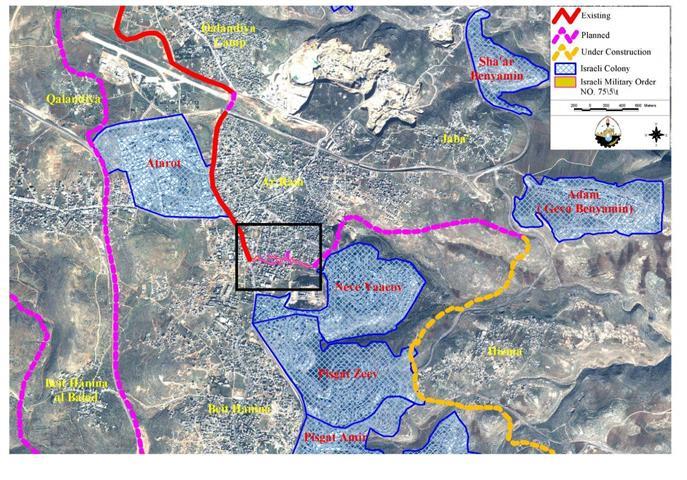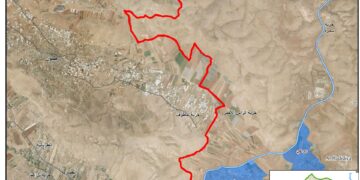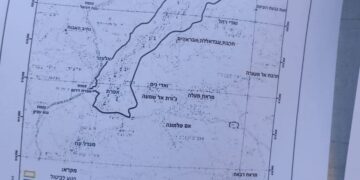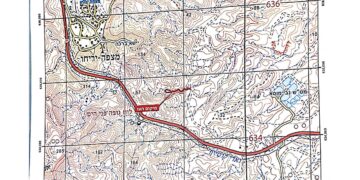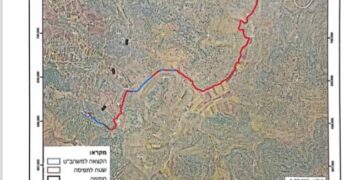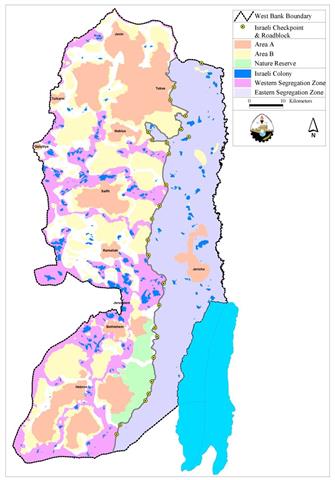On June 22, 2005, the Israeli High Court of Justice issued a temporary restraining order to stop constructions of the Segregation Wall planned in the southern part of Ar Ram Town (Dahiet Al Barid neighborhood), which was supposed to break through the residential houses cutting the neighborhood into separate parts.
The order came in response to the many petitions raised by Ar Ram39;s council, the local inhabitants and the institutions located in Dahiyat Al Barid against the construction of the Segregation Wall in the area.
Earlier on March 2005, the Israeli Occupation Forces (IOF) had served out residents of Dahiet Al Barid military order number (05/57/T Judea & Samaria 2005) stating the seizure of 26.2 dunums of land, making a way for a new section of the Segregation Wall to be constructed on lands of the area .. Click here for related articles
Ar Ram is a Palestinian town, located approximately 7 kilometers northeast of Jerusalem city center. The built-up area of the town is approximately 3,289 dunums (3.3 km2). The Wall stretches for six kilometers around Al Ram, encircling the built-up area from almost all sides, controlling the movement of its residents and appropriating large areas of Palestinian lands for the expansion of illegal Israeli settlements. Upon the completion of the wall in the town, Ar Ram and part of Dahiet Al Barid will be cut off from the rest of East Jerusalem and isolated in a tiny ethnic Palestinian ghetto. (See map one). ).
Map 1: Location map, Dahiet Al Barid neighborhood, Ar Ram town and the path of the Segregation Wall.
The Israeli plan to construct the wall in the area intends to isolate an active part of Dahiet Al Barid from the rest of its community, Ar Ram town. The area that is going to become segregated by the Wall includes a number of institutions, they are as shown in map two:
1. Rosary Sister school
2. Rosary Sister Monastry
3. Franciscan Monastry
4. Latin Club
5. Coptic collage monasteries
6. Orthodox club
7. World Bank and USAID
8. British Institution
Map 2: Institutions located at Dahiet Al Barid that will be isolated by the Wall
Status of the Wall in Ar Ram Town:-
The Segregation Wall which is under its final stages of construction, will encircle Ar Ram town, including Dahiet Al Barid neighborhood, from three sides: From the west, separating the area from northwest Jerusalem villages such as Beir Nabala, Al Jib, Al Judeira and Beit Hanina al Tahta where a 6-8 meters high wall is already constructed along the main road from Jerusalem to Qalandyia checkpoint and dividing the area into two parts, (click here for related articles);See Photo 1;
from the south, a section which is under debate, is planned to be constructed and will separate part of Dahiet Al Barid from the rest of the community itself and from Ar Ram town;
from the southeast, the constructed section will separate Al Ram from the nearby illegal settlement of Neve Yaacov; and finally from the north road number 445. Thus, Ar Ram will be confined in a big ghetto where more than 50,000 people will be isolated from the nearby villages and from East Jerusalem. Ar Ram will also lose its southeastern lands, which are the only reserve lands for future extension, and which will be isolated at the other side of the wall (close to the illegal settlement of Neve Yaacov). See photo 2 & Photo 3 &
Conclusion:
The Wall being built in and around Ar Ram town will place it in an isolated Ghetto, adding it to the rest of the Palestinian communities that have also been severely affected by such a blatant violation.
The Segregation wall results in the violation of human rights including the right to freedom of movement, access to holy places, to work, to health, to education, and to an adequate standard of living. The International Court of Justice (ICJ) decision supports the right to self-determination of the Palestinian people, which they are prevented from exercising by the wall39;s disruption of the territorial integrity and unity of the population. 39;Self-defense39; or 39;state of necessity39; can not be used as justification for violating this right and other international legal principles and therefore Israel must cease construction and all other states must refrain from supporting Israel in building the Wall 39; Article 11 of the ICESCR requires states parties to 39;recognize the right of everyone to an adequate standard of living for himself and his family, including adequate food, clothing and housing, and to the continuous improvement of living conditions39;.
Referances
-
[1] International Covenant on Civil and Political Rights
-
[2] supra note 1, para. 129
-
[3] International Covenant on Economic, Social, and Cultural Rights and the United Nations Convention on the Rights of the Child
-
[4] supra note 1, para. 118
-
[5] supra note 1, para. 122
-
[6] supra note 1, para. 142
-
[7] supra note 1, para. 145
-
[8] supra note 1, para. 146
Prepared by:
The Applied Research Institute – Jerusalem


